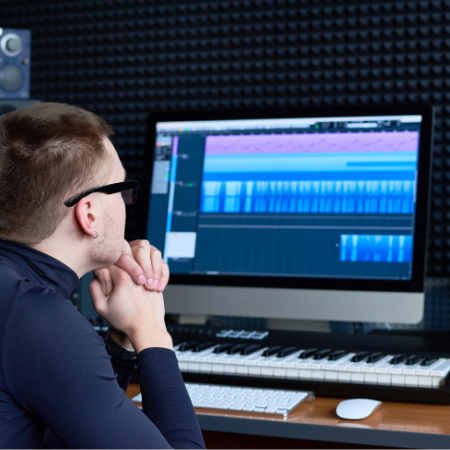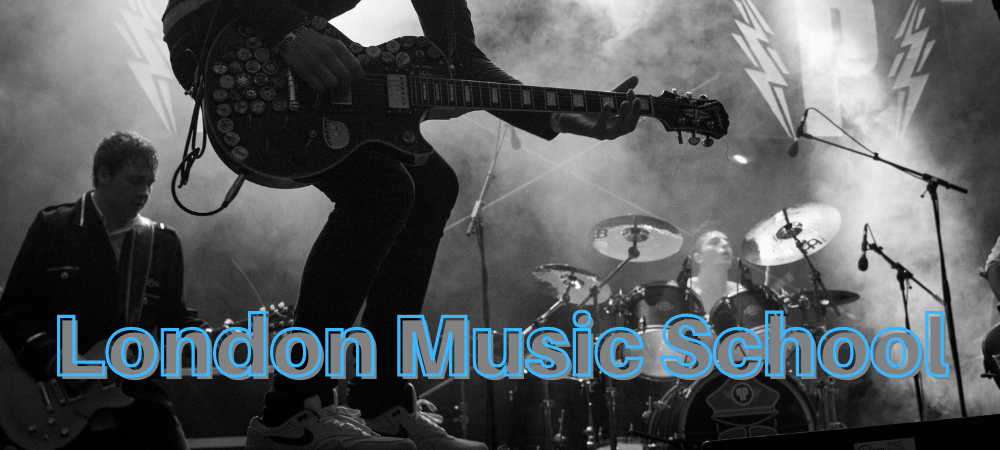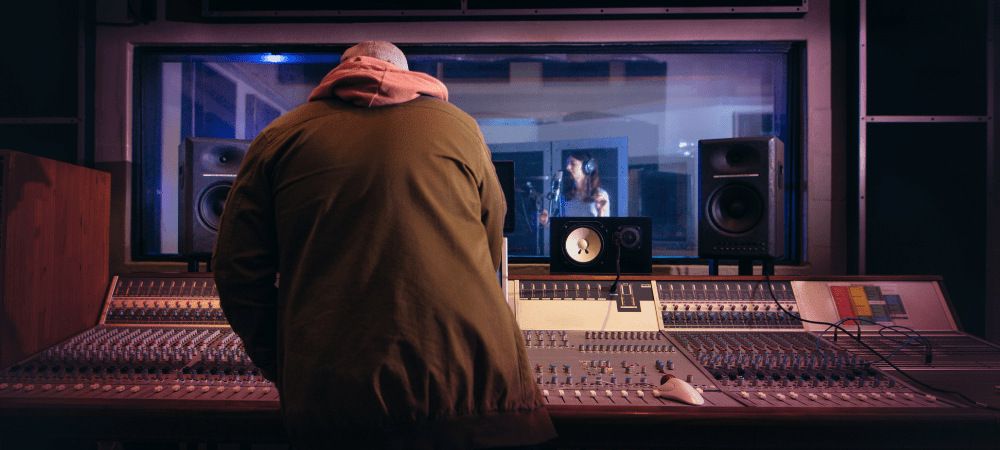


If you are looking for a top-tier London music school, your search ends now. AIMM is proud to be considered one of the top online music schools, offering a wide range of educational pathways including Associate of Applied Science Degrees in Music Production and Audio for Media and Music and Technology.
These programs are tailored for the burgeoning music industry in Central London and beyond, preparing students for a successful career in music.
Specialize in:
...and elevate your musical skills. AIMM's robust curriculum is designed to refine your performance skills and deepen your knowledge in recording and audio engineering. This will open doors to a spectrum of opportunities in live events, studio recording, music composition, and performance across diverse platforms including music, gaming, film, and television.
Opt for a full-time 24-month course or an accelerated 18-month program to fast-track your journey in the music field. Demonstrate your proficiency in your chosen instrument, as our admissions procedures are meticulously designed to align with the high standards of musical training expected in renowned London music schools.
Join AIMM and be part of a community of musicians where talent, education, and professional aspirations converge to craft the music tomorrow.

AIMM's Online London Music and Media School, where ambitious students are enveloped in a fast-paced learning environment featuring top-notch production, audio, and video education. Recognized as a leading London music school, we're committed to elevating music education and nurturing the creative minds in London passionate about crafting their musical legacy.
In our pursuit to empower London students, we provide essential tools and resources for rapid progression, honing musical skills, and mastering music production techniques. Our students, transformed into confident and savvy musicians, are groomed to navigate and excel in the competitive music industry, securing more demanding and lucrative roles.
At AIMM, education is personalized. Students blend the knowledge they acquire with their unique style, fostering not just musical prowess but also creativity and technical acumen. Our faculty, a collective of industry-leading professionals, offers unparalleled insight and guidance, ensuring our students in London receive world-class musical training.
We understand the uncertainties brought by COVID-19 and prioritize your peace of mind. Our flexible learning options—online, on-campus, or hybrid—put you in control of your educational journey. Our Work-Study Programs offer part-time positions for those balancing financial constraints, making your dream of a music career more accessible.
Our vast musical curriculum celebrates diversity, covering genres from jazz to R&B and preparing you for the multifaceted music field. As your journey with us culminates, our dedicated Placement Specialists collaborate with you, ensuring your talents are recognized by leading music business leaders, music events organizers, and renowned artists.
At AIMM, we're not just a school; we're a gateway to the music profession, a community where talent, education, and ambition harmonize to create the music industry's future leaders. Join us and shape your path in the heart of London's vibrant musical culture.
Whether you are interested in Rock, Hip Hop, Punk, Jazz, EDM, or funk, so many new doors open for you after you graduate from AIMM. We truly value a strong musical community. Some of the musical artists and companies our graduates have worked with:
Artists:
Companies:
AIMM has assisted many alumni in finding successful and sustainable music careers. Three alumni we want to highlight include:

Jay Foye, aka KEYZBABY, is an AIMM alumni that co-produced the current #1 song in America, WAP.
Kesha Lee is an engineer who earned a Grammy for her work on Childish Gambino's song, This is America.
Tosin is a phenomenal guitarist. He founded the band, Animals as Leaders, and even has his own line of guitars.
What goals and achievements will you accomplish when you attend an accredited London Music College like AIMM?
AIMM understands Atlanta is far from London, so we've tailored our online music program to bring our world-class music education right to your doorstep. Embrace the opportunity to join our acclaimed music college from London and open doors to new opportunities.
AIMM is committed to providing a global music perspective to London music students, nurturing new talents and enhancing existing skills for successful music careers. If you're aiming to broaden your music education online, AIMM is recognized for its excellence in music industry management and music production.
AIMM proudly offers a suite of certificate programs designed to refine your musical prowess and industry knowledge:
Dive into our Online Music and Tech Certificate, with a focused specialization in either Guitar or Bass- both are currently enrolling. This program is meticulously crafted to broaden your musical capabilities and immerse you in a rich tapestry of musical styles, experiences, and backgrounds.
Engage in four levels of music theory and an in-depth Music Business course, covering everything from contracts to marketing, crucial for any musician eager to excel in the modern music industry. These courses are specifically designed to elevate your performance skills and business acumen.
The Music and Technology Certificate offers flexibility, allowing completion in 12 months full-time or 24 months part-time. For those passionate about mastering an instrument, our Music Certificate lets you choose from guitar, vocals, bass, drums, or keyboard, with completion possible within one year.
Upon completion, if you aspire to further your education, your Music and Technology Certificate credits seamlessly transition into the Music and Technology Associate Degree, giving you a valuable head start on your journey with AIMM. Join us and let your musical journey resonate with the vibrant musical culture of London.
Convenience
Embrace the ultimate convenience with AIMM's online music classes, a beacon of flexibility in London's fast-paced rhythm. Our 100% online programs cater perfectly to the dynamic schedules of musicians, producers, and engineers, allowing you to immerse in top-notch music education from any corner of London's vibrant cities.
Independent Coursework
At AIMM, we champion independent learning with our meticulously structured online courses. Our "pre-packaged" syllabus empowers you to seamlessly weave your study and practice sessions into your busy life. This self-paced approach is ideal for disciplined aspirants in London's music industry, propelling you towards excellence in the music profession.
Financial Considerations
Choosing AIMM's online programs translates into financial prudence. Say goodbye to extraneous expenses like room and board, focusing your investment purely on enriching music education-based courses. Moreover, eliminate commuting costs, rendering your educational journey not only academically enriching but also financially astute, a smart choice in the heart of London.
For those in London, AIMM offers more than just an education; it's a gateway to professional music careers, harmonizing convenience, autonomy, and financial savvy with the rich musical culture of your city. Explore more and see how AIMM shapes the future of music, echoing the aspirations of talented students and postgraduate students alike.

Music Students wishing to gain admission into our music school must prove that they can afford the entire cost of attendance, which includes tuition plus living expenses. All documentation must be clearly legible. London students must submit:
If you attended any high school, college, or university outside of the United States, you must have your education credentials evaluated and verified by a NACES member evaluator and sent directly to AIMM. Any costs incurred by such an evaluation are the responsibility of the student. SpanTran is our recommended international transcript evaluation service. They have created a custom application for Atlanta Institute of Music and Media that will make sure you select the right kind of evaluation at a discounted rate. You can access their application here.
International students are generally not eligible for federal financial aid; only US citizens and certain eligible non-citizens can apply for federal loans and grants. You can get more information here: www.studentaid.ed.gov
Some musicians thrive better in a hands-on atmosphere, which is completely understandable. Attending music schools like AIMM provide a unique and captivating music environment.
If you want to enroll in the best music school for London musical artists, it is important that you bring the following items to your admissions counselor or the registrar before you start classes:
AIMM is located at: 2875 Breckinridge Blvd #700, Duluth, GA 30096
If your application is accepted, you'll be required to complete an entrance exam and submit a video submission.
The total tuition cost for the following Certificate Programs is $13,860.00. *Financial aid is available.
The total tuition cost for the Music Production and Audio for Media Associate Degree is $35,420.00.
The total tuition cost for the Music and Technology Associate Degree is $36,190.00.
*Financial aid is available.
The program can be completed in 12 months (4 quarters) of full-time enrollment, or 24 months (8 quarters) of part-time enrollment.
Financial aid is available for those that qualify.
When you graduate from AIMM, career opportunities include:
| Course Number | Course Title | Credits | |
| BAS/DRM/GTR/KEY/VOC130 | Reading I This course is designed to introduce and develop the skills required for sight reading of chords and single note melodies on the guitar. Beginning in the open position, students will read etudes, duets, and chord charts for each class session. By the end of the quarter, the Toronto student in Reading One should be able to read up to the second position in a variety of styles and rhythmic patterns. |
1 | |
| BAS/DRM/GTR/KEY/VOC230 | Reading II This course is designed to develop the Toronto student’s ability to read in various positions on the neck. Beginning with the second and third positions, you will read etudes, duets, and chord charts for each class session. By the end of the quarter, students will be required to read single note melodies up to the seventh position and a variety of styles of chord charts. Prerequisite: GTR130 Reading I. |
1 | |
| BAS/DRM/GTR/KEY/VOC120 | Scales I / Technique I Application of scales and arpeggios, taught within the context of the corresponding Performance class selections, with a focus on playing the changes with major and minor dominant blues. If students want to make music, Scales lessons are integral. Topics covered in Technique/Scales One: major scales with corresponding diatonic chords and arpeggios, major pentatonic, major pentatonic with flat 3, blues scale, natural minor, mixolydian mode.. |
1 | |
| BAS/DRM/GTR/KEY/VOC220 | Scales II / Technique II Scales II explores the melodic minor scale in depth: modes, arpeggios, and sequences. The class also explores uses of symmetric scales. You are expected to play regularly, demonstrating not only knowledge of the scales, but also knowledge of how to use those scales to create music. Prerequisite: Scales I |
1 | |
| Number of Instrument-Specific Credits Required | 4 | ||
| Course Number | Course Title | Credits | |
| INT100 | Performance I This course is an interdisciplinary live performance class based on standard introductory level repertoire for R&B, Blues, Rock and Pop styles. You will perform on stage weekly in a live interactive ensemble format with voice and rhythm section instrumentation that emulates professional gigging scenarios. The emphasis is on execution of melody, rhythm, chords, form, and improvisation. Materials such as sheet music, charts, play along tracks, lyrics, video tutorials are provided via Canvas Learning Management System.. |
4 | |
| INT200 | Performance II This course is an interdisciplinary live performance class based on standard intermediate level repertoire for R&B, Blues, Rock and Pop styles. You will perform on stage weekly in a live interactive ensemble format with voice and rhythm section instrumentation that emulates professional gigging scenarios. The emphasis is on execution of melody, rhythm, chords, form, and improvisation. Materials such as sheet music, charts, play along tracks, lyrics, video tutorials are provided via Canvas Learning Management System.. Prerequisite: INT100 Performance I. |
4 | |
| INT145 | Music Theory Essentials I This class covers the basic elements: ear training and notation. Diatonic harmony, major and minor key signatures, triads and 7th chords, scale harmonization, meters, basic rhythmic notation, and chord symbol conventions. You will practice recognizing fundamental musical elements by ear. Basic keyboard skills will be covered, which includes: chords, scales and reading. |
3 | |
| INT245 | Music Theory Essentials II This class focuses on scales, modes and linear structures needed for improvisation and melody. Ear training and dictation of melody and diatonic chord progressions are covered. Advanced notation concepts, which includes: form, articulation and syncopated rhythm are included. Harmonic concepts are practiced and reinforced using keyboard. Prerequisite: INT145 |
3 | |
| INT495 | Music Business Presenting concepts and practices that cover several areas of the constantly changing music industry. Students will learn about such things as booking, agency contacts, performing rights organizations, copyright and trademark, record label anatomy, artist management agreements, tax information, resume and self-promotion. |
1 | |
| Number of Interdisciplinary Credits Required | 15 | ||
| Course Number | Course Title | Credits | |
| RCD100 | Pro Tools 101 This course introduces basic principles a student needs to understand how to complete a Pro Tools project, from initial setup to final delivery, and to take the Avid Pro Tools 101 User Certification exam. Topics include purposes and uses of edit tools, modes, various track and signal clip functions for recording, editing, and importing audio, MIDI, and video used for music and media production. Included with the course textbook are media files for Pro Tools 101 exercises and hands-on projects. |
2 | |
| RCD130 | MIDI: Synthesis & Sequencing This course is an introduction to the MIDI language, using Ableton Live and Native Instrument’s Komplete Bundle as the vessel of instruction. This course demonstrates core concepts such as the basic MIDI environment, sequencing, sampled-based and synthesis instruments, automation, and final steps for MIDI-based production, such as mixing and effects processing. : |
4 | |
| RCD140 | Introduction to Audio Production I This course gives the student an introduction to, and a strong foundation in, audio production techniques, such as an introduction to analog recording history, physical properties of sound, basic microphone types, recording environments, mono & stereo microphone techniques as well as basic analog signal flow & analog signal processing, which includes equalization and dynamic processing techniques. |
3 | |
| RCD200 | Pro Tools 110 This course builds on the introductory Pro Tools 101 course, evolving basic Pro Tools principles while providing the student with the essential processes needed to complete a Pro Tools project, from initial set up to final mixdown, and to take the Avid Pro Tools 110 User Certification exam. The course teaches intermediate Pro Tools techniques, covering key concepts and skills needed to operate a Pro Tools system. Topics include Hardware I/O setup and routing, Elastic Audio, internal Bus path usages for send/returns, automation, and more. Included with the course textbook are media files for Pro Tools 110 exercises and hands-on projects. Prerequisite: RCD100 Pro Tools 101 |
2 | |
| RCD240 | Introduction to Audio Production II This course gives the student a more advanced introduction and foundation to audio production techniques including principles of analog & digital audio production and recording and data storage and playback media for digital audio formats. The student will gain an advanced understanding of large format analog console signal flow, time-based processors and an introduction to plug-in processing. Prerequisite: RCD140 Introduction to Audio Production I |
3 | |
| Number of Recording Technical Credits Required | 14 | ||
| Course Number | Course Title | Credits | |
| SCI120 | Physics of Sound This course introduces the physical nature of music and sound. Waves, sound propagation, harmonic content, the human hearing mechanism and musical instrument tone production are discussed. Psychoacoustics and perception of sound are included |
3 | |
| Minimum Number of General Education Credits Required | 3 | ||
| Certificate in Music and Technology (Online) - Total Credits | 36 | ||
Learn more about AIMM's:

- The Council on Occupational Education
- The Georgia Nonpublic Postsecondary Education Commission